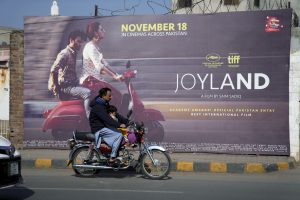Pakistan’s Oscar entry, “Joyland,” a film that has already won awards at the Cannes Film Festival, is facing furious controversy at home. Under pressure from conservatives, the federal government banned the film and then lifted the ban. Will the film be screened as scheduled on November 18 in Punjab, where it has been banned again?
A week ago, the movie, which is about a transgender woman, was banned from being screened in cinema halls in the country. The federal Ministry of Information and Broadcasting decided to ban the film after it received complaints that the film was a “threat to the country’s cultural and social fabric.”
The decision to ban the film was taken under Section 9 of the Motion Picture Ordinance 1979. Under this law, to be issued a certificate of screening a film must conform to the social values and moral standards of Pakistani society.
Filmmakers and activists took the issue of the ban on “Joyland” to social media, where they called for the movie’s screening in Pakistan. This resulted in Prime Minister Shehbaz Sharif forming a committee to evaluate the complaints against the film.
Subsequently, the federal government lifted the ban, and the Central Board of Film Censors, after cutting some scenes in the film, permitted its release on November 18.
In an interview on a television show, “Joyland” director and writer Saim Sadiq said they were asked to exclude some words from the film’s dialogue and make some other minor tweaks to the film, which they worked on.
But 24 hours before “Joyland’s” scheduled release in cinema halls, the Punjab censor board, one of the country’s biggest, banned the film again.
Sadiq said that that “the problem is the story also includes a character of a transgender.”
It does seem that it is the depiction of the life of a transgender person that people are objecting to.
As Sadiq points out, “It is acceptable to show transgenders being made fun of, but once they are shown as normal persons, living normal lives, that becomes problematic and against social values.”
Several Pakistani movies have been banned in the past. Films like “Zindagi Tamasha,” “Javid Iqbal: The Untold Story of a Serial Killer,” and “I Will Meet You There” were banned for either being based on sensitive issues or their negative portrayal of Pakistan’s social and cultural values. For example, the film “Javid Iqbal” is based on an investigation into the life of a serial killer who killed around a hundred young boys in Lahore and sent evidence of his crimes to the authorities and media in 1999.
What appears to have upset those opposing “Joyland’s” screening is the portrayal of a transgender woman living a normal life like any other person in the community, and especially her friendship with a “culturally acceptable” married man. This friendship is something unacceptable in Pakistani society, which has traditionally treated transgender people as outcasts.
“There is nothing in the film that does not really align with the cultural and social values,” Doastain Baloch, a filmmaker and screenwriter himself who has worked with the director of “Joyland” told The Diplomat. “But, perhaps, it is the way the film is challenging the existing ideology and portrays transgenders as normal humans” that underlies their criticism. “That might be something people fear.”
“As a society, we are used to only consuming clichéd ideas, themes, and stereotypes. For example, a male character would always be authoritative, that of a woman always submissive and of transgenders, if ever shown, they will always be depicted as outcasts,” Fatima Naeem, an art student in Karachi told The Diplomat.
“In Pakistan, for decades it has been clichés and stereotypes. This has impacted us so much that we have a hard time even watching something with a new perspective, let alone accepting it,” she said.
Some believe that the film has come at the wrong time. In September this year, several legislators and clerics began a debate over amending a landmark transgender rights bill that was passed in 2018, which they believe directly contradicts religious teachings and values.
Although laws in Pakistan give transgender people the right to their gender identity and recognition in government records, these rights have not been fully implemented. Pakistan has a long way to go to achieve that.
What is particularly interesting about the calls for banning “Joyland” is that people are opposing it even before its release. They are up in arms against a movie they haven’t seen.













